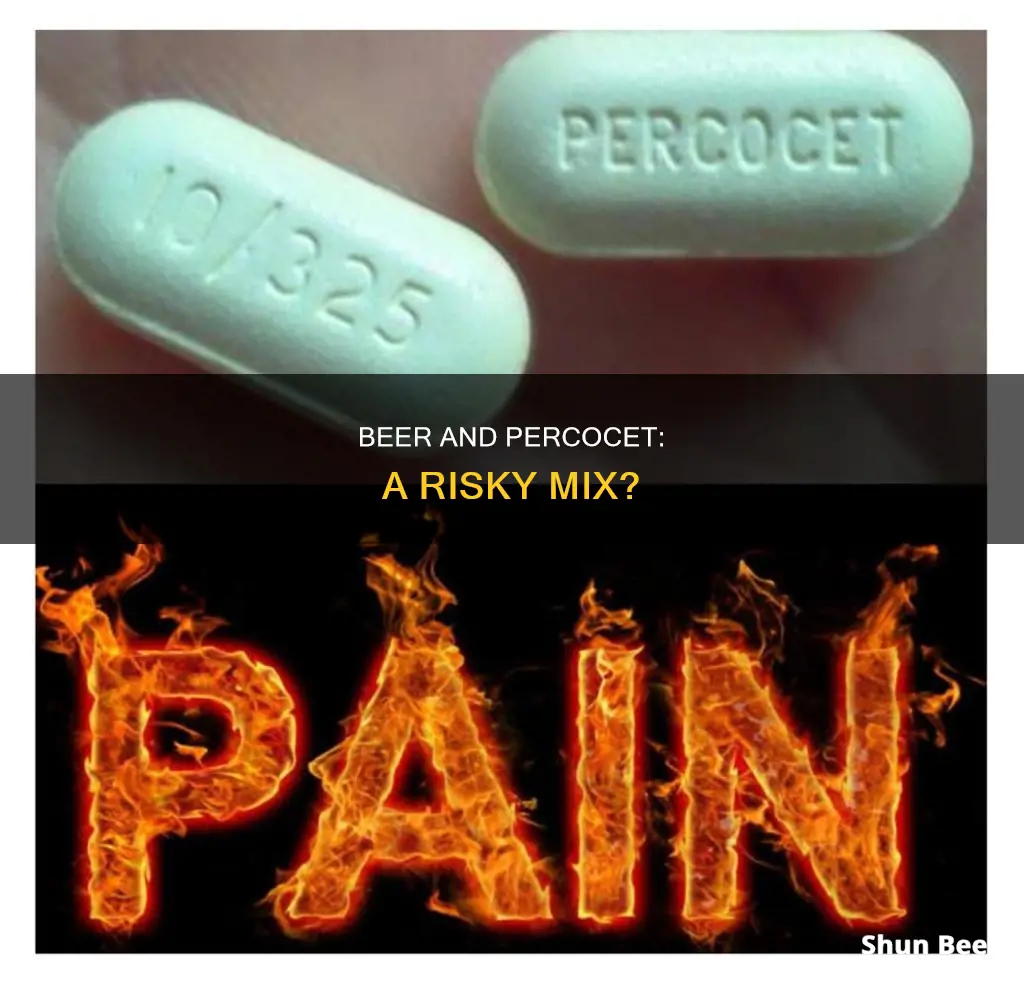
Mixing alcohol and Percocet, a prescription painkiller, can be dangerous and even lethal. Both substances are central nervous system (CNS) depressants, which slow down brain activity, and can lead to slowed breathing and heart rate, loss of consciousness, and even death. The combination of the two can also cause irreversible liver damage and increase the risk of opioid overdose and addiction. Due to these serious health risks, it is recommended to cut out alcohol until at least 24 hours after stopping Percocet treatment.
| Characteristics | Values |
|---|---|
| Oxycodone half-life | 4-4.5 hours |
| Oxycodone stays in your system for | 24 hours |
| Oxycodone and alcohol | CNS depressants |
| CNS depressants | Slow down brain activity |
| CNS depressants | Slow down breathing and heart rate |
| CNS depressants | Impair judgment and coordination |
| CNS depressants | Cause feelings of euphoria |
| Mixing oxycodone and alcohol | Increases the risk of addiction |
| Mixing oxycodone and alcohol | Increases the risk of overdose |
| Mixing oxycodone and alcohol | Increases the risk of liver damage |
| Mixing oxycodone and alcohol | Can be lethal |
What You'll Learn

Mixing alcohol and Percocet can be deadly
Mixing alcohol and Percocet can have serious health risks and side effects. Both substances are central nervous system (CNS) depressants, which slow down parts of the brain, causing feelings of relaxation and intoxication. CNS depressants also slow down vital bodily functions, such as breathing and heart rate. When taken together, these effects are amplified, increasing the risk of a fatal overdose.
Enhanced Effects
When CNS depressants are combined, the effects of both substances are enhanced. This means that taking alcohol and Percocet together can make you feel "drunker" and "higher" than you would if you were consuming either substance alone. This increases the risk of injury, especially if you get behind the wheel of a car.
Increased Absorption of Opiates
In some cases, it has been found that consuming alcohol with an opiate drug increases the absorption rate of the opiate, leading to enhanced effects. This can be extremely dangerous, as it increases the risk of respiratory depression and a slowed heart rate, which can be fatal.
Risk of Side Effects
Both alcohol and Percocet can cause side effects when consumed individually, and combining the two substances can increase the potential for these side effects. These side effects include loss of coordination, irregular heart rate, and loss of consciousness.
Liver Damage
Percocet contains acetaminophen, which is only mildly toxic to the liver when taken at the prescribed dose. However, when alcohol is added to the mix, the potential for hepatotoxicity (liver poisoning) increases. This is because the enzyme that breaks down acetaminophen in the body also breaks down alcohol, leading to a higher concentration of the drug in the bloodstream and an increased risk of liver injury and permanent liver damage.
Increased Risk of Addiction
Alcohol and oxycodone, one of the main ingredients in Percocet, cause feelings of euphoria by stimulating the production of dopamine and serotonin. Over time, the brain's reward center becomes less responsive to these drugs, leading to drug tolerance and an increased risk of addiction. Taking alcohol and Percocet together can make addiction worse and decrease the likelihood of successful substance abuse treatment.
In conclusion, mixing alcohol and Percocet can have serious and potentially deadly consequences. The combination of these substances amplifies their effects, increasing the risk of side effects, liver damage, overdose, and addiction. It is crucial to avoid consuming alcohol while taking Percocet to prevent these dangerous health risks.
Beer and Conception: What Men Should Know
You may want to see also

Oxycodone and alcohol are both central nervous system (CNS) depressants
Oxycodone is an opioid painkiller, while alcohol is the most commonly abused drug in the United States. Both have similar effects on the brain and body, including slowing down breathing and heart rate, impairing judgment and coordination, and causing feelings of relaxation and intoxication. When taken together, these effects are amplified, increasing the risk of injury, overdose, and addiction.
The combination of oxycodone and alcohol can be life-threatening. It can lead to respiratory depression, where carbon dioxide levels increase in the body while oxygen levels fall, resulting in fainting, slowed heart rate, respiratory failure, coma, brain damage, and even death. The risk of an opioid overdose is further increased when alcohol is involved, with health officials reporting that 37% of overdose deaths caused by the combined use of alcohol and drugs involve opioids.
In addition to the physical dangers, the use of oxycodone and alcohol together can also worsen addiction. Alcohol use increases the likelihood and effects of opioid addiction, and people who abuse both substances are less likely to respond to substance abuse treatment.
Due to the risks associated with combining oxycodone and alcohol, it is recommended to wait at least 24 hours after the last dose of oxycodone before consuming alcohol. However, the specific amount of time one should wait can vary depending on personal factors such as the amount of oxycodone used and the duration of use. It is always best to consult with a healthcare provider to determine the appropriate amount of time to wait.
Beer and Basketball: A Match Made in Heaven?
You may want to see also

Mixing the two can cause irreversible liver damage
Mixing alcohol and Percocet can cause irreversible liver damage. This is because both substances are toxic to the liver. Alcohol is a central nervous system (CNS) depressant that slows down parts of the brain, inducing feelings of relaxation and intoxication. Oxycodone, the opioid in Percocet, is also a CNS depressant that affects balance, coordination, reflexes, memory, judgment, and concentration.
When alcohol and oxycodone are mixed, their CNS depressant effects are amplified. This includes a decrease in breathing and heart rate, which can be fatal. The combination of the two can lead to respiratory depression, a condition characterized by minimal or no breathing at all. This is a form of suffocation that, if left untreated, can quickly cause brain damage and death.
In addition, the potential for liver damage is increased when alcohol and oxycodone are mixed. The enzyme that breaks down acetaminophen, a component of Percocet, also breaks down alcohol. Due to the competition for this enzyme, less acetaminophen is broken down, resulting in higher levels of the drug in the bloodstream. This increases the risk of liver injury and, in some cases, permanent liver damage.
Mixing alcohol and Percocet can also increase the risk of addiction and overdose. Both substances cause a surge of dopamine, a neurotransmitter associated with pleasure and reward. Regular abuse of alcohol and oxycodone can lead to a decrease in naturally produced dopamine, making it difficult to feel pleasure without the drugs. This can result in a cycle of abuse and addiction.
The side effects of mixing alcohol and Percocet are dangerous and should be avoided. It is crucial for individuals taking Percocet to avoid alcohol consumption and give their body enough time to eliminate the drug from their system before drinking.
Beer and Meloxicam: Is It Safe to Mix?
You may want to see also

It increases the risk of opioid overdose
Combining alcohol with Percocet, a prescription painkiller, can be life-threatening. Both substances are central nervous system (CNS) depressants, which slow down parts of the brain, causing feelings of relaxation and intoxication. When taken together, the effects of each substance are amplified, increasing the risk of an opioid overdose.
Oxycodone, the opioid in Percocet, is a powerful drug that reduces the experience of acute and chronic pain. It attaches to receptors in the brain that are specialised for neurotransmitters like endorphins and enkephalins. It also causes sedation and euphoria by increasing dopamine activity in the brain.
Alcohol is also a CNS depressant, slowing down the actions of neurons in the CNS. It slows down a person's breathing, heart rate, and blood pressure. It also impairs judgment and coordination, making it harder for the brain to coordinate functions like balance, memory, speech, and judgment.
When alcohol and Percocet are mixed, the effects of both substances are enhanced, increasing the risk of an opioid overdose. This includes a significantly decreased breathing rate and heart rate, which can be fatal. Mixing alcohol and Percocet can also cause irreversible liver damage if consumed excessively or over a long period of time.
The risk of an opioid overdose is further increased by the fact that both substances can lead to physical dependence and addiction. Mixing alcohol and Percocet can make addiction worse and increase the risk of developing physical dependence. This is because both substances cause feelings of euphoria by stimulating the production of dopamine, the "feel-good" hormone. Over time, the brain's reward centre becomes less responsive to alcohol and oxycodone, requiring higher doses to achieve the same effects.
In summary, mixing alcohol and Percocet can be extremely dangerous, leading to a heightened risk of an opioid overdose, irreversible liver damage, and addiction. It is crucial to avoid mixing these substances to prevent serious health consequences.
Beer and Furosemide: Is It Safe to Mix?
You may want to see also

Combining alcohol and Percocet can worsen addiction
Combining alcohol and Percocet can have serious health risks and can worsen addiction. Both alcohol and oxycodone, the opioid in Percocet, are central nervous system (CNS) depressants. CNS depressants slow down parts of the brain, inducing feelings of relaxation and intoxication. They also slow down vital functions like breathing and heart rate. When mixed, the CNS depressant effects of both substances are amplified, increasing the risk of respiratory depression and heart problems.
The combination of alcohol and oxycodone can also impair judgment and coordination, increasing the risk of injury, especially if driving a car. The risk of liver damage is also increased when mixing alcohol and Percocet. Acetaminophen, an ingredient in Percocet, is mildly toxic to the liver on its own, but when alcohol is added, the potential for hepatotoxicity (liver poisoning) increases. This is because the same enzyme that breaks down acetaminophen is also responsible for breaking down alcohol, leading to higher levels of the drug remaining in the bloodstream and increasing the risk of liver injury.
Alcohol and oxycodone also affect the brain's reward center by stimulating the production of dopamine and serotonin, resulting in feelings of euphoria and relaxation. Over time, the brain's reward center becomes less responsive to these drugs, leading to drug tolerance and an increased risk of addiction. Alcohol use has been shown to increase the likelihood and effects of opioid addiction, and people who abuse both substances are less likely to respond to substance abuse treatment.
The dangers of mixing alcohol and Percocet are significant, and there is no "safe" amount of alcohol to drink while on this medication. It is crucial to avoid alcohol consumption while taking Percocet and to wait at least 24 hours after the last dose before drinking, as oxycodone can stay in the system for about 24 hours. Seeking help from a substance abuse treatment program or contacting the Substance Abuse and Mental Health Services Administration (SAMHSA) National Helpline is essential for anyone struggling with alcohol and/or Percocet addiction.
Cancer Patients and Beer: What's Safe to Drink?
You may want to see also
Frequently asked questions
Mixing alcohol with Percocet is dangerous and can have serious consequences. Both substances can slow breathing, impair judgment and coordination, and be toxic to the liver. These effects are amplified when they are taken together, increasing the risk of an opioid overdose, unconsciousness, slowed heart rate, respiratory failure, coma, brain damage, and death.
Oxycodone, the opioid in Percocet, stays in your system for about 24 hours. It is recommended to wait at least one day after your last dose before drinking alcohol. However, the specific amount of time you should wait depends on factors such as how much oxycodone you used and how long you have been using it. It is best to consult your healthcare provider to determine how long you should wait.
Signs and symptoms of a Percocet and alcohol overdose include loss of coordination, irregular heart rate, loss of consciousness, slowed or ragged breathing, a loud rattling when breathing, pale or clammy skin, bluish lips or fingers, nausea, and vomiting. If you suspect someone has overdosed, call 911 or seek immediate emergency care.







